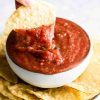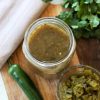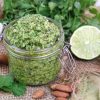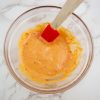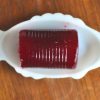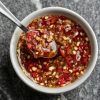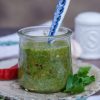Easy Barbecue Sauce Recipes A Simple Guide
Easy Barbecue Sauce Recipes
Easy barbecue sauce recipes – The allure of homemade barbecue sauce lies in its ability to transform a simple grilled meal into a culinary masterpiece. The ease of creating delicious, customized sauces at home empowers home cooks to explore a world of flavor profiles, far surpassing the limitations of store-bought options. This guide delves into the art of crafting easy barbecue sauces, exploring essential ingredients, flavor variations, and practical tips for achieving the perfect consistency and taste.
Introduction to Easy Barbecue Sauces, Easy barbecue sauce recipes
Easy barbecue sauces have gained immense popularity among home cooks due to their simplicity and versatility. They allow for creative experimentation with different flavor combinations, resulting in unique and delicious sauces tailored to individual preferences. Barbecue sauce history is rich and varied, with regional styles evolving over centuries. From the vinegar-based sauces of the Carolinas to the tomato-based options prevalent in the Midwest, each region boasts its unique interpretation.
An “easy” barbecue sauce recipe typically involves minimal ingredients, straightforward preparation steps, and a short cooking time. It prioritizes ease of execution without compromising on flavor.
Essential Ingredients and Their Roles
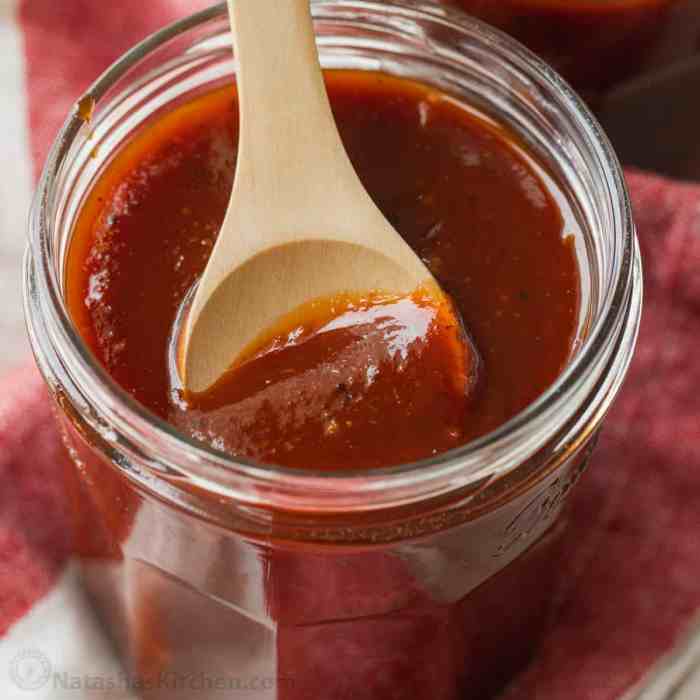
Source: natashaskitchen.com
The foundation of most barbecue sauces rests on a few key ingredients, each contributing significantly to the overall flavor profile. Tomatoes provide sweetness and body, while vinegar adds acidity and tang. Sugar balances the acidity and adds sweetness, and spices contribute depth and complexity. Different vinegars, such as apple cider vinegar, white wine vinegar, or red wine vinegar, impart distinct flavor notes – apple cider vinegar lends a fruity sweetness, while white wine vinegar offers a sharper tang.
Brown sugar offers a richer, more molasses-like flavor compared to the cleaner sweetness of granulated sugar.
| Spice Combination | Flavor Profile | Suggested Vinegar | Sweetener Suggestion |
|---|---|---|---|
| Paprika, garlic powder, onion powder | Sweet and Savory | Apple Cider Vinegar | Brown Sugar |
| Chili powder, cumin, smoked paprika | Smoky and Spicy | Red Wine Vinegar | Brown Sugar |
| Black pepper, cayenne pepper, mustard powder | Tangy and Spicy | White Wine Vinegar | Granulated Sugar |
| Ginger, garlic, soy sauce | Savory and Umami | Rice Vinegar | Honey |
Basic Recipe Variations
Three distinct flavor profiles can be achieved by making simple adjustments to a basic barbecue sauce recipe. These variations demonstrate the versatility of the base recipe and the ease with which it can be customized.
- Sweet Barbecue Sauce:
- Increase the amount of brown sugar.
- Add a touch of molasses for deeper sweetness.
- Reduce the amount of vinegar.
- Smoky Barbecue Sauce:
- Add 1-2 teaspoons of liquid smoke.
- Incorporate smoked paprika.
- Use a touch of chipotle powder for a hint of smokiness and heat.
- Spicy Barbecue Sauce:
- Increase the amount of chili powder or cayenne pepper.
- Add a pinch of red pepper flakes for extra heat.
- Consider using a habanero pepper for a more intense flavor.
Enhancing Flavor and Texture
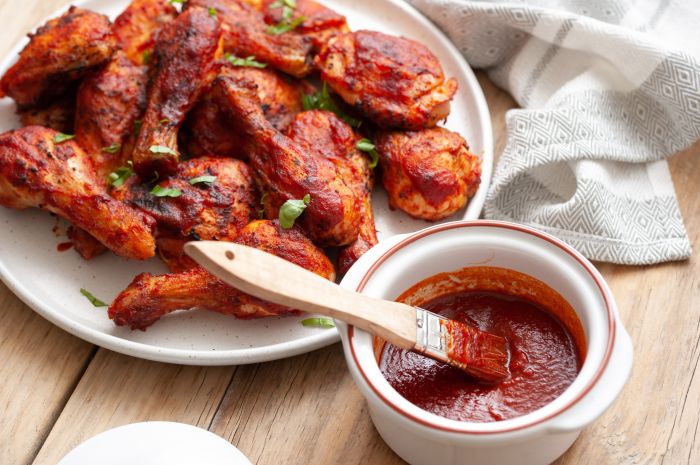
Source: thespruceeats.com
Liquid smoke adds a profound smoky flavor without the need for actual smoking. Other flavor enhancers such as Worcestershire sauce, soy sauce, or even a touch of coffee can add complexity. Achieving the desired consistency is crucial. Simmering the sauce longer will thicken it naturally, while a cornstarch slurry (cornstarch mixed with cold water) can be added for a quicker thickening effect.
Different sweeteners, like honey, maple syrup, or agave nectar, can provide unique flavor profiles and varying levels of sweetness.
Serving Suggestions and Applications
Barbecue sauce’s applications extend far beyond grilling. Its versatility makes it a culinary chameleon, adaptable to various dishes and cooking methods.
| Application | Flavor Profile Suggestion | Texture Description |
|---|---|---|
| Marinade | Sweet or Savory | Thin |
| Dipping Sauce | Any | Medium |
| Glaze | Sweet and Sticky | Thick |
| Burger Topping | Spicy | Medium |
| Sandwich Spread | Sweet and Savory | Medium |
| Meat | Best Sauce Variation |
|---|---|
| Pork Ribs | Smoky |
| Chicken | Sweet or Spicy |
| Beef Brisket | Savory |
| Salmon | Sweet and Savory |
Visual Guide to Barbecue Sauce Consistency
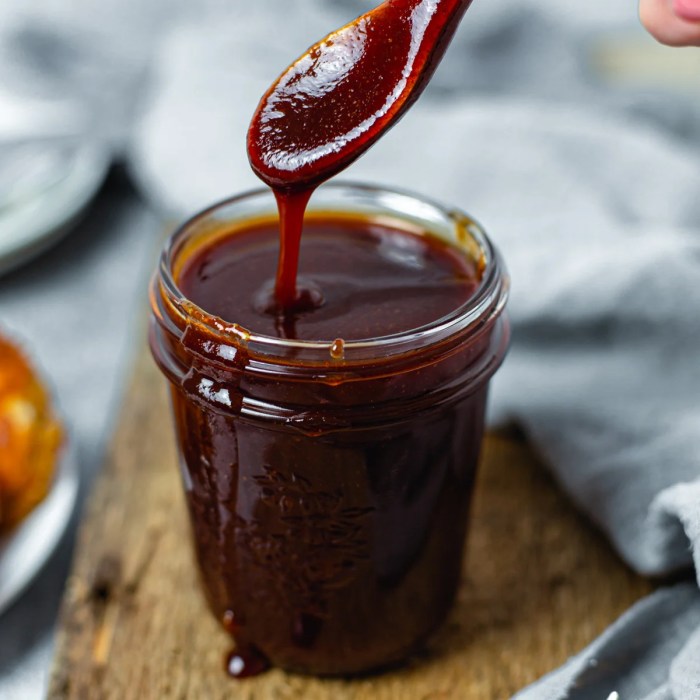
Source: thissillygirlskitchen.com
The ideal consistency of barbecue sauce varies depending on its intended use. A visual guide helps ensure the right texture for each application.
Thin: The sauce flows easily, almost like a light syrup. It’s ideal for marinades and basting.
Medium: The sauce coats the back of a spoon evenly but doesn’t drip excessively. This consistency works well for dipping sauces and as a topping.
Many find easy barbecue sauce recipes incredibly versatile, allowing for customized flavor profiles. To add a fiery kick, consider incorporating a touch of heat; for inspiration, check out this amazing best hot sauce recipe for some seriously delicious ideas. This will elevate your easy barbecue sauce recipes to a whole new level of flavor, offering a delightful balance of sweet and spicy.
Thick: The sauce is very viscous and clings to the food. It’s perfect for glazes and creating a sticky, flavorful coating.
Troubleshooting Common Problems
Several issues can arise during barbecue sauce preparation. Addressing these problems proactively ensures a successful outcome.
- Burning: Reduce heat and stir frequently to prevent scorching. Add a splash of water or broth if needed.
- Too Thin: Simmer the sauce for a longer period to allow excess moisture to evaporate. Alternatively, use a cornstarch slurry to thicken it.
- Too Sweet: Balance the sweetness by adding more vinegar or a touch of lemon juice. Add a pinch of salt to enhance the other flavors.
Storage and Shelf Life
Proper storage is essential for maintaining the quality and safety of homemade barbecue sauce. Refrigerate the sauce in an airtight container for up to a week. Freezing extends its shelf life to several months, although the texture might slightly change upon thawing.
FAQ Resource
Can I use honey instead of brown sugar?
Yes, honey adds a unique sweetness and moisture. Start with a smaller amount than the brown sugar called for in the recipe, as honey is naturally sweeter.
How long does homemade barbecue sauce last?
Properly refrigerated, homemade barbecue sauce will typically last for 1-2 weeks. Freezing extends its shelf life to several months.
What should I do if my sauce is too thin?
Simmer the sauce uncovered for a longer period to reduce excess liquid. Alternatively, you can thicken it with a cornstarch slurry (mix 1 tablespoon cornstarch with 2 tablespoons cold water) and stir it into the simmering sauce.
My sauce is burning! What went wrong?
Reduce the heat to low and simmer gently, stirring frequently. Make sure your pot is large enough to prevent overcrowding. Burning often occurs when the sauce is too thick or the heat is too high.



